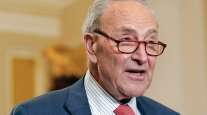Senior Reporter
Transportation Stakeholders Press Congress on $1 Trillion Infrastructure Bill

[Stay on top of transportation news: Get TTNews in your inbox.]
To guarantee long-term funding for the country’s freight and passenger mobility systems, transportation stakeholders are urging Congress to pass a $1 trillion infrastructure measure.
Executives representing the freight industry, the business sector, construction firms, environmental groups and transit systems have pressed U.S. House lawmakers to approve the Senate-passed infrastructure measure.
Included in the bill is a multiyear update of the country’s federal highway law, known as the FAST Act. The law’s authorization expired Sept. 30 but has been extended for 30 days.
Speaker Nancy Pelosi provided House Democrats with a new Oct. 31 target date to pass the stalled bipartisan infrastructure bill, saying she backed off a pledge to bring the measure to a vote Sept. 30 and Oct. 1 because it would have been defeated.
“We must pass BIF well before then — the sooner the better, to get the jobs out there,” wrote Pelosi in a letter to her caucus on Oct. 2, referring to the $1 trillion infrastructure package.

Spear
Separately, Congress on Sept. 30 approved a short-term funding bill that will avert a partial government shutdown.
“We expect them to vote. We expect them to put America first before their own jobs. That’s what they were sent here to do. This is inexcusable,” American Trucking Associations President Chris Spear said. He highlighted truckers’ contributions to safety and the economy, and he cited their key role in the supply chain to maintain the flow of goods during the pandemic.
With passage of the infrastructure measure, Spear explained: “The money is going to flow immediately. It’s going to flow to the states. It’s going to give state [departments of transportation] the ability to plan year-over-year.”
State of Play
As of 5:15 p.m. EDT Oct. 2
Short-term spending bill: Approved Sept. 30; keeps government funded to Dec. 3
Infrastructure bill: No vote taken in House pending agreement on larger reconciliation bill
Highway funding reauthorization: Expired at midnight Sept. 30; House and Senate approved a 30-day extension
The U.S. Chamber of Commerce also is pushing for passage of the infrastructure legislation, pointing to its potential economic benefits across myriad sectors. Chamber CEO Suzanne Clark observed, “Our elected leaders are on the precipice of a historic investment in our nation’s crumbling infrastructure. Turning this long-overdue promise into a reality will grow our economy and strengthen our competitiveness for decades to come.”
Paul Skoutelas, CEO of the American Public Transportation Association, endorsed the infrastructure bill’s allocation of more than $100 billion for public transportation programs. He recently told a House committee: “Investing in public transit will significantly reduce greenhouse gas emissions, improve air quality and public health, and help transform our nation’s transportation network for a sustainable future.”
Congressional leaders insist the House is prepared to clear for President Joe Biden the $1 trillion infrastructure policy legislation. Pelosi urged colleagues to support the bill, which is a pillar of the president’s domestic agenda.
Investing in public transit will significantly reduce greenhouse gas emissions, improve air quality and public health.
Paul Skoutelas, CEO of the American Public Transportation Association
“We all know that we have to build back in a responsible way to meet our green climate initiatives and our goals and our responsibilities in that regard,” the speaker said. “Passing an infrastructure [bill] is always exciting for what it means in terms of jobs and taking our country into the future. And it’s always been bipartisan over the years here, not for a while because there was resistance when President [Barack] Obama was president. We passed a bill, but that was not of the magnitude we needed.”
Leading up to the vote scheduled but not held Sept. 30, the caucus’ progressive bloc pushed back on voting on the infrastructure package without a vote on a $3.5 trillion social infrastructure budget measure. Rep. Pramila Jayapal (D-Wash.), the Congressional Progressive Caucus’ chairwoman, champions big-picture reforms. As she put it, “This agenda is not some fringe wish list. It is the president’s agenda, the Democratic agenda, and what we all promised voters when they delivered us the House, Senate and White House.”

Jayapal
Since the bipartisan infrastructure legislation was not approved by Sept. 30, federal authorization of surface transportation programs expired. To avoid funding disruptions to state DOTs, the House passed a 30-day extension Oct. 1 and the Senate approved it Oct. 2.
Republican leaders, meanwhile, continue to criticize the Democrats’ agenda. House Republican Leader Kevin McCarthy of California argued the majority’s plan would hinder small businesses: “The short answer is the Biden administration is more interested in handouts that pay more, or just as much, to stay home than go back to work.”
“Democrats want to use this temporary pandemic as a Trojan horse for permanent socialism. They’ve all but said so. And that is what millions and millions of Americans elected 50 Republican senators to fight against,” Senate Republican Leader Mitch McConnell of Kentucky said recently.
Democrats want to use this temporary pandemic as a Trojan horse for permanent socialism.
Mitch McConnell, Senate Republican leader
In addition to the multiyear reauthorization of policies in the FAST Act highway law, the infrastructure bill would provide about $100 billion for highways and bridges, $66 billion for freight and passenger rail operations, $65 billion for rural broadband internet access, $46 billion for severe weather-resilience climate change programs, $39 billion for transit systems and $25 billion for modernization projects at airports. Specific to trucking policy, the legislation would establish a truck-leasing task force and approve an apprenticeship for commercial drivers younger than 21 to drive interstate.
Want more news? Listen to today's daily briefing below or go here for more info:






